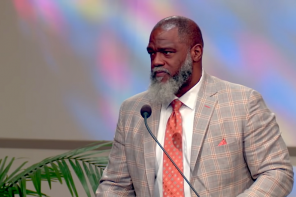Reconstructionist home school leader Doug Phillips has outlined “A Christian Response to Earth Day” on his blog and conservative criticism of today’s celebration of Earth Day is widespread.
RD Contributor and Religion Scholar Bron Taylor wrote about the current divide both here at RD and here, explaining that, historically, the conflict over the proper relationship between humans and nature has been between
“those who conceive of God as beyond the world and are indifferent to the Earth, those who share the belief in an otherworldly God but think that he demands good environmental stewardship and those who consider the earth itself sacred.” (italics added)
While Taylor writes about the third group who believe the earth is sacred, I want to explore a division within the second, those who emphasize stewardship.
Much has been made among progressive Christians this year about the fact that Earth Day and Good Friday have fallen on the same day. Bishop Eugene Robinson suggested, for example, that the coincidence of dates might be Divine Providence, and many have reflected on the significance of the Easter season for concern over renewal of planet earth. Celebrating Earth Day seems entirely compatible with this understanding of stewardship.
One might expect that the opponents of earth day are mostly in the first camp, (indifferent to the earth) but in fact, they are not.
They do, however, have a very different understanding of stewardship, found in the combination of dominion theology and another part of Christian Reconstruction known as Presuppositionalism. As I explained a few months back when an Ohio judge with ties to Phillips and Rushdoony posted his “Philosophies of Law in Conflict” on the wall in his courtroom:
“Rushdoony…argues that all systems of knowledge are ultimately rooted in assumptions (presuppositions) that cannot be proven…’Knowing’ begins with choosing an authority to follow, and there are only two choices: God or human reason. In this view, there is no sphere of human life that is not religiously significant. Every aspect of life is subject to God’s law. Anyone who says otherwise is in rebellion against God and making their own reason the measure of all things.”
Or as Phillips put it in his Earth Day post: “All men are religious because all men have an object of worship….In the end, men will either worship and serve the creature, or they will worship and serve the Creator…”
Moreover, according to dominion theology the earth was given to Adam (and all “man”kind) as the stage on which to fulfill his calling: dominion.
Or as Phillips puts it:
“Man is God’s appointed steward on earth, and his core mission is to be His agent of dominion over it. Toward this end, God has placed all things under man to be used for his benefit and to be carefully stewarded and cultivated for God’s glory.”
Earth Day, with its alternative view of the relationship between humans and the earth, becomes a High Holy Day for Paganism, bringing with it the presuppositions of paganism, pantheism and humanism and serving as the focal point in a conflict between two mutually exclusive, all encompassing, worldviews:
“This religious devotion to the material world as god comes in many shapes and sizes, but it has become ubiquitous in our culture. The new pantheism is at the heart of the green movement. It is reflected in the priorities of Hollywood, in the agenda of politicians, and in the curriculums of the government schools. It is found in the marketing campaign of Madison Avenue, in the reality TV shows of cable television, and sadly, even in pulpits across the nation.”
So this is the other meaning of “stewardship;” the one at play in much of the right’s chorus against Earth Day.
“We are losing the debate …because of the Christian community’s fear of the God-ordained, perpetually valid, creation precept called “The Dominion Mandate.” This mandate directs man is to rule over the earth, subduing it and taking dominion over it for his benefit and for God’s glory.”




